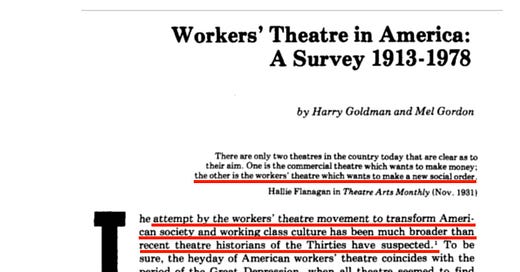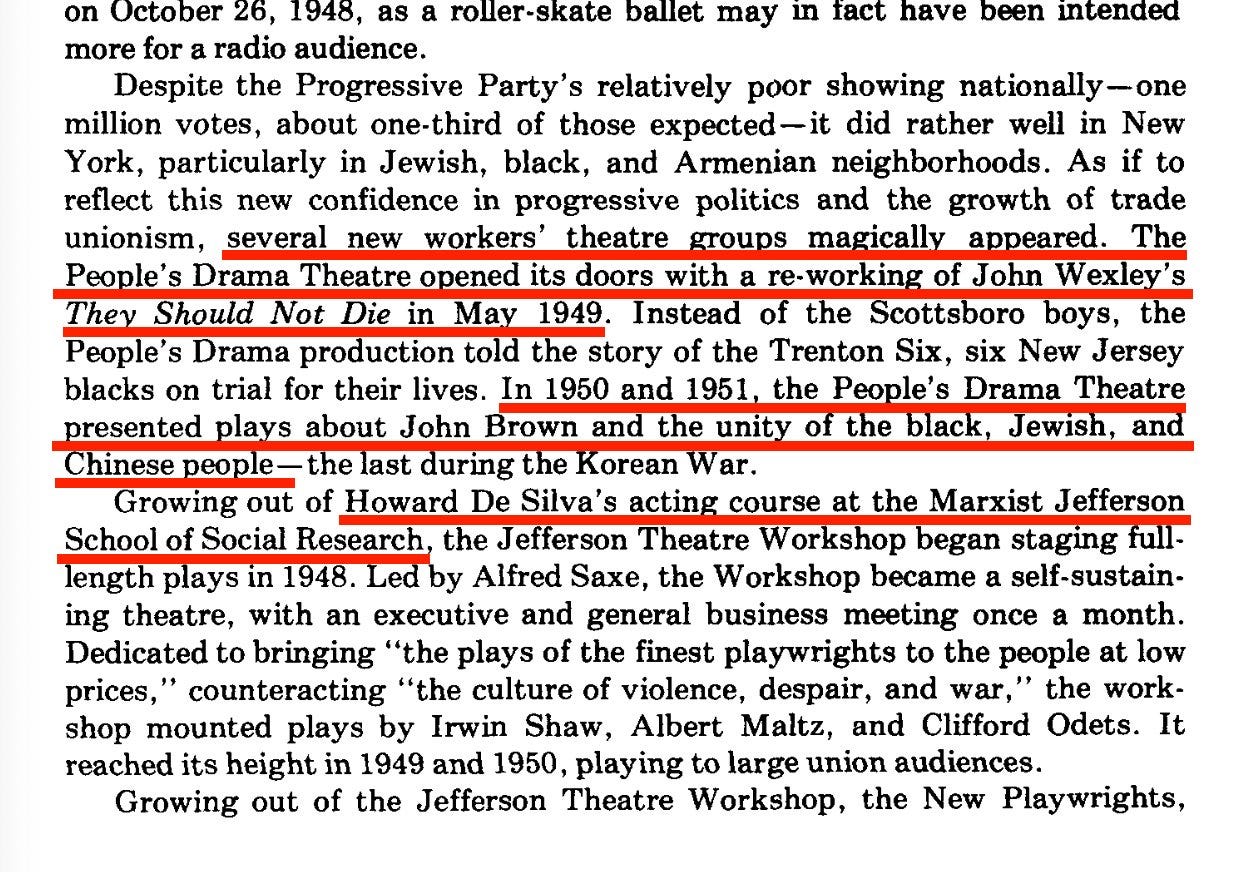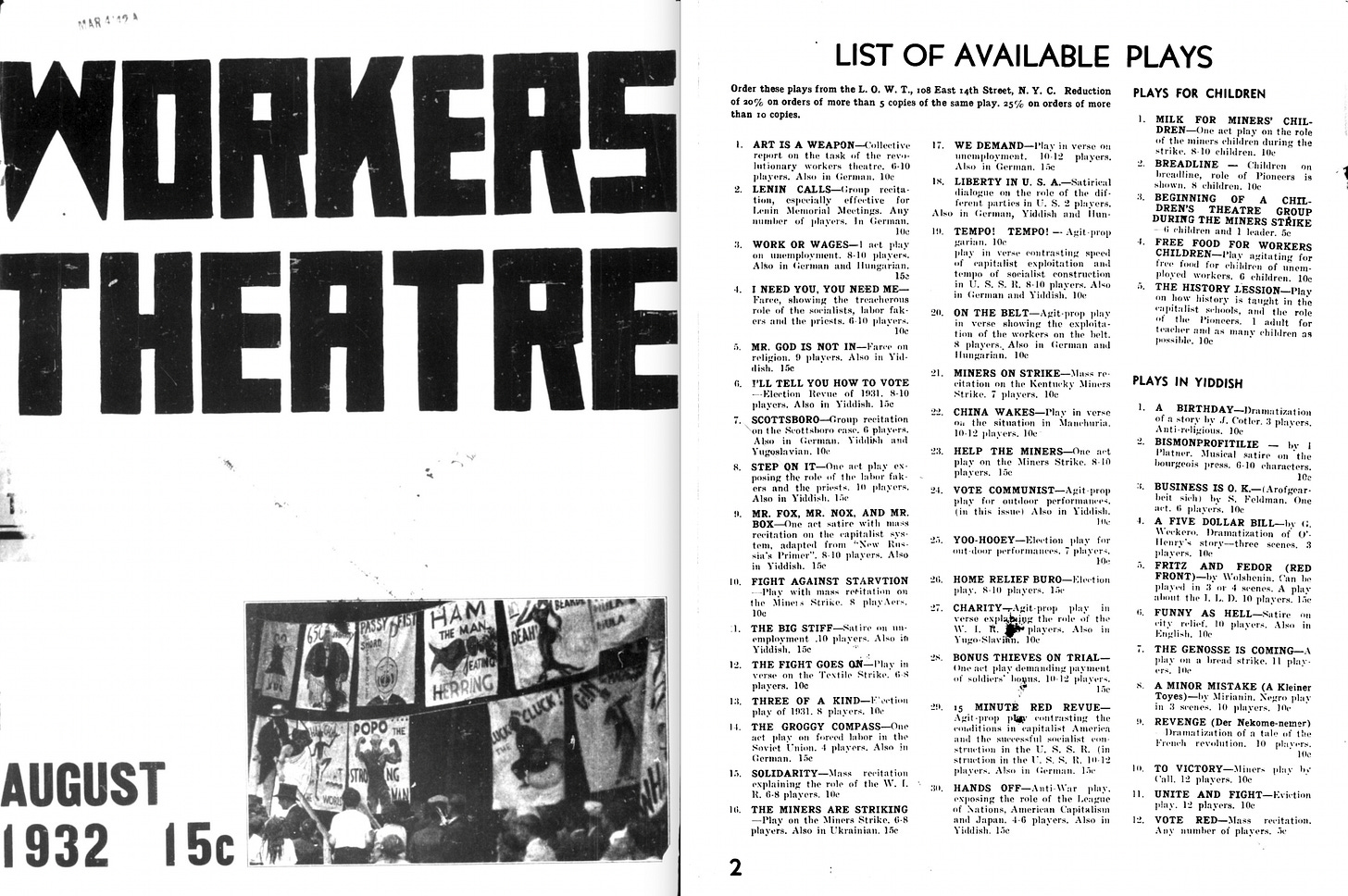Communism: The Workers' Theatre in America
The ‘Worker's Theatre in America’ saw its American launch in 1913. The first play related to the class struggle.
Which, needless to say, is THE topic on the Marxist agenda.
The movement really started to gain traction in the mid-to-late 20s, took full advantage of the depression, through which it peaked in the mid-30’s - but it carried on all the way up through the late 40s.
It should be fairly obvious why it came to a halt in the early 1950s, but we’ll get to that soon enough.
In 1944, even Franklin D Roosevelt’s wife - Eleanor - got into Workers’ Theatres. They crafted their message - play - specifically to the target audience, be it factories, army canteens, or even churches.
Another entry was Jasper Deeter, Veteran director of the Provincetown Players, Workers’ Drama League.
'Members of the collective were equally responsible for all tasks involved in running the theatre'.
And this genuinely is a brilliant source. It details how Wayland Rudd is sent to the Soviet Union, treated to the finest propaganda at the time, only then to return to the US and immediately train to perform similar, and then went on to... ... explicitly star in a show pushing class warfare communism.
For the more astute, this fits right into the Frankfurt School Critical Theory. I won’t bore you with a long lecture, but just outline the very simple concept - all of it relies on a very simple trick.
What the Frankfurt School realised was that class warfare wouldn’t succeed, when framed in terms of just economics. So they broadened the message. Instead of being about the proletariat versus the bourgeoisie, it became oppressor versus oppressed, or even more simply - us versus them.
Rich vs poor
Man vs woman
Black vs white
Straight vs gay
Old vs young
Fat vs thin
… and so on.
Later on, to maintain a complete matrix of manipulation, they invented ‘intersectionality’, which basically is simply a palette of the categories above, ranked in terms of, well, political expedience. In short, it’s about manipulation, and creating conflict, the express opposite of what they claim.
What this means is that if you’re a thin, wealthy, young, straight white male in the contemporary West, you’ll be sidelined and ignored, regardless of competence. You’re bottom rung of the totempole of victimhood.
I’m sure you realise how easily exploitable this framework is, and that’s the point.
But at its very core, it hasn’t truly changed since Marx penned his manifesto. It’s Marxism, through and through.
-
But back to the topic at hand - the worker’s theatre.
Now, I could spend paragraph after paragraph outlining exactly how the Workers’ Theatre initiative is also Marxism. Or, alternatively, I could just link to the Marxists very own website.
‘First, [workers theatre] must awaken to class consciousness leading to organization;
second, it must go to the masses rather than wait for the masses to come to it; and
third, it must have mass appeal.’ --Albert Prentis
This document, penned in 1931, details classic marxist techniques, of which one is distraction (sex, frequently), another is subtle manipulation. The document also interestingly informs that the narrative is set by a committee, ie, the entire approach is top-down centralised.
And if you’re still unsure, how about this edition of their magazine. Look at the plays on offer; ‘vote communist’, ‘the miners are striking’, and ‘vote red’.
A lot of literature on the topic happens to exist, and there really is no doubt. This is certified Marxist trash. And, in a way, it's incredible to read because at no point do they consider honesty as a way forward. The trick is always subtle manipulation.
They also pull the old United Nations trick - create narratives which are impossible to reject, or you’ll be a social outcast. You know, like ones centred around women and children, the marginalised, and so forth.
Another amusing tidbit - much like today they can be sponsored by the elite, yet don’t even ask why! That a banker would ever sponsor them… well, better ignore that. They will.
Performance ranged from full theatre displays, to 5 minute engagements, typically agitprop.
But in the mid-1930s, shock agitprop theatre no longer did the trick, instead the Workers’ Theatres gradually accommodated liberalism to reflect a more mainstream ideology in their productions.
However, the Marxists never went away. They just went into hiding. The Bolshevik became Menshevik. Ultimately, however, Menshevik and Bolshevik aim for the same target, it’s just a question of path taken.
There’s a great paper on this topic here. Goes into much greater detail than I.
-
From all of this, we can state that Marxists had a growing presence from 1913 onwards in the United States via Workers’ Theatre groups.
But what also needs highlighting is how the recruitment process worked. And in that regard, while 5 minute street performances of agitprot did its part to convert workers to utopian Marxism, the Moscow-linked Communist Party of the United States of America (CPUSA) tried their very hardest to recruit in the leadership of the various Labour Unions, with some levels of success.
-
The next document from their very own website is this - from 1935. ‘Fight against war and fascism’.
This document shows how they operate, and how insanely hypocritical they truly are. When faced with the issue of recruitment, they break down the people into groups, and craft the message specifically for each individually - just as the case was above for churches, factory workers, or army canteens. What this means is that they don’t appeal to the common man, but rather, appeal specifically to minorities, youth, veterans, … - regardless of how insanely stereotyping - and racist - this is.
They are exempt from the very rules they impose on you.
-
Does this approach remind you of something? Well, if you read the article on the One Health Workforce of tomorrow, it should. Because within, it details the One Health Academy Module on ‘behaviour change’, which explicitly uses the same technique.
-
Here it is, in short. The objective should be non-divisible, and what that means is that rather than message the common man, instead they break this up into subgroups, and then signal them individually. It’s a technique we see again and again; after all, there’s a reason why the United Nations appeal to women and minorities repeatedly.
-
Another trick in the Marxist playbook of course is to just incessantly create promises of something in return for nothing. Promise utopia. Lie, basically. Doesn’t matter, once you’ve gained power, who will hold you to account?
Here’s from another issue of ‘Fight against War and Fascism’ (which, for the record, was a communist front should it not be obvious).
Although it starts off admitting that the United States is incredibly affluent, and that there are no shortages, and that the United States is akin to a giant factory, they proceed to make one unsubstantiated claim after another; by running the factories faster they promise that everyone can become wealthy, scarcity is a thing of the past. It even goes as far as to lament that US workers on average only received $50/month extra via FDR’s work-relief program, which in annual terms was $600/month, at a time where average income was $2,000 per year. In other words, this program represented a 30% income increase - yet, the Marxists still were not happy.
They also never consider why the United States is so successful. It just is. And it still will be regardless of political ideology imposed.
It’s one utopian claim after another, but regardless of how much you negotiate and compensate, it will never be enough. Whatever your conceed, the goalpost will immediately be moved - in other words, don’t ever negotiate, because they don’t do so in good faith.
-
So, to sum up this article;
Workers’ Theatres organised from certainly 1913 onwards in the US.
Their literature is explicit - they were Marxists.
They would lie, distort, and manipulate to carry out their objective.
Rules imposed upon ideological opponents were not followed by their own.
They were highly organised.
They aimed to recruit from the working class.
A part of these efforts went through Workers’ Theatres.
The other part was supposed to go through Labour Unions.
-
To be continued



















